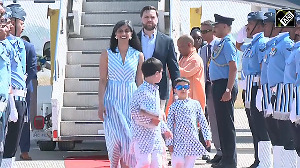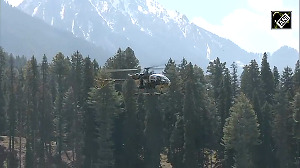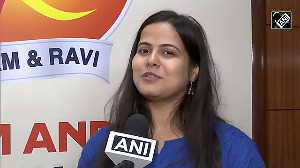New Delhi, as the only agent that enjoys trust in all the key capitals, must offer itself as a back-channel interlocutor, says Ajai Shukla
Barely masked by the warm sunshine in Washington is a stormy political mood over Iran's defiant refusal to halt uranium enrichment despite the most far-reaching economic sanctions in recent times.
That failure is being blamed partly on India, especially in the United States media, for New Delhi's refusal to terminate oil imports from Iran and its choice to, instead, deepen trade ties with Teheran.
"Delhi is turning out to be the mullahs' last best friend," trumpeted the Wall Street Journal.
With Team Obama's political gaze focused on re-election in November, the White House fears that a pre-emptive military strike by Israel on Iran's nuclear facilities might transform the discourse of the election campaign.
That fear was fanned last Tuesday by the dramatic formation of a national unity government in Israel, when the leftist Kadima Party hopped over from the opposition to join Prime Minister Binyamin Netanyahu's Likud government.
To American observers, the Israeli polity seems to be closing ranks for a military strike on Iran's nuclear facilities. Israel had formed a national unity government, in similar fashion, before launching the fateful Six Day War in 1956.
Washington has tried to restrain Israel by arguing that tightening sanctions would bring Iran around. But several countries, including India, make this a difficult argument to sell.
India buys some 350,000 to 400,000 barrels of oil from Teheran every day, since our energy requirements do not allow the tap to be turned off suddenly. Although Iran's share of our oil imports is just 10.4 per cent today, down from 16.5 per cent in 2008, that translates into a billion dollars a month for Teheran.
India, everyone admits, is not alone in importing oil from Iran. Teheran obtains greater support from Beijing and Moscow, especially in the United Nations Security Council. But given the media perception that New Delhi must constantly repay the debt of the US-India nuclear agreement, India's oil purchases are portrayed as the unkindest cut of all.
Interestingly, the US' senior leadership does not share this media and think-tank obsession. Washington is displaying sensitivity to Iran's role in the Indian strategic calculus: as an oil supplier; as a gateway to Afghanistan and Central Asia; and as an emotional locus for Indian Shia Muslims.
Washington knows that New Delhi does not want a nuclear Iran; India voted against Iran in the International Atomic Energy Agency twice, in 2005 and 2009. The US is also aware of Iran's unrelenting assault over decades on crucial Indian interests, e.g. the Jammu & Kashmir issue, in bodies like the Organisation of Islamic Conference.
New Delhi has also pointed out that some four million Indians live and work in West Asia. A major regional conflict stemming from an attack on Iran could force India into a major evacuation, far larger than those that were necessary during the two US wars against Iraq (1990-91 and 2003) and during Israel's invasion of Lebanon (2006).
And so Washington, for now, is not reacting to the media drumbeat that an ungrateful New Delhi is siding against Washington on a crucial foreign policy issue, just as it had on Libya and Syria.
This reflects intensified conversations between New Delhi and Washington, and a growing maturity in the relationship. New Delhi has been understanding of America's engagement and even arms supplies to Pakistan -- surely a key Indian foreign policy concern -- and now the US is accommodating India's compulsions on Iran.
Their strategic objectives converge: neither likes the idea of Teheran brandishing nukes. The divergence is on how that is best achieved.
New Delhi, with its own experience in beating sanctions in the quest for nuclear weapons, believes that coercion alone would only deepen Iranian determination.
Alongside the spectre of economic disruption and military force, Iran must be offered a face-saving withdrawal through cast-iron security guarantees.
Given America's physical presence on both its flanks, Israeli sabre-rattling and the contemporary lessons of Iraq, Libya and Syria (in contrast to nuclear North Korea and Pakistan), it would be surprising if Teheran were not to conclude that nuclear weapons are the only guarantee of regime survival.
India can offer more than advice, howsoever sage. Negotiations with Iran are going nowhere, although the so-called P5+1 (the five permanent UN Security Council members, plus Germany) will meet Iranian negotiators later in May.
The ongoing process is based on mutual deception. Teheran is fighting a rearguard action to gain space for its nuclear weapons programme; meanwhile the P5+1 is arm-twisting Iran without addressing its core concerns.
The technical issues of verification, inspection and relocation of nuclear fuel that are discussed upfront must be complemented with a back-channel process that addresses the key issue of Iranian insecurity. New Delhi, as the only agent that enjoys trust in all the key capitals -- Teheran, Washington, Riyadh, Tel Aviv, Ankara and Moscow -- must offer itself as a back-channel interlocutor.
For years, New Delhi's strategic policy of multi-alignment has built trust and equity in these countries. Stepping up to the plate would enhance Indian stature; cement relations with important regional and global powers; and defuse the threat of a confrontation that can only end in turmoil.











 © 2025
© 2025